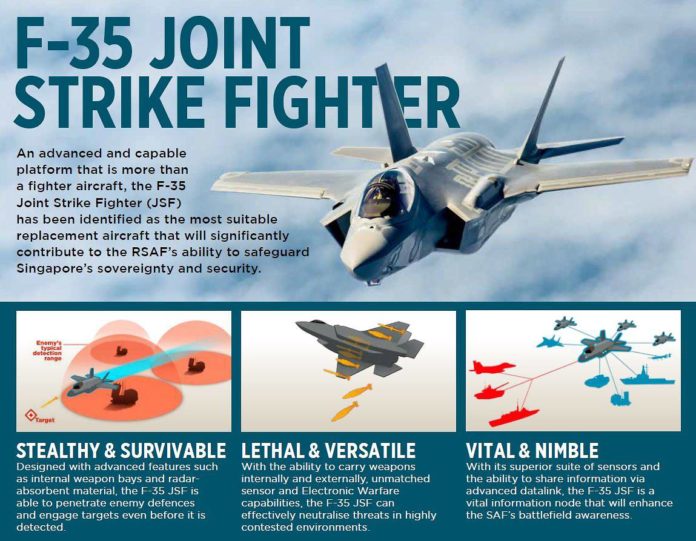SINGAPORE: Developing a capable Singapore Armed Forces (SAF) to protect the nation’s interests and keeping Singaporeans safe for another generation will require “significant and steady investments”, said Minister for Defence Ng Eng Hen in his Committee of Supply speech on Friday (Mar 1).
“Defence, especially for a small island like Singapore is crucial, if we are to safeguard our interests and deter aggression,” said Dr Ng. “Singapore is on track to build a modernised tri-service SAF … that can meet security challenges both in the real and virtual worlds in the 21st century.
“If we continue our steady investments into defence and our NSmen maintain their commitment and resolve to defend Singapore, then our future will be secure for another generation. We can look forward to celebrate SG75 with the assurance that we have strong defences.”
Defence spending for Financial Year (FY) 2019 is expected to hit S$15.5 billion, up from S$14.8 billion the previous FY, Finance Minister Heng Swee Keat had previously announced in his Budget statement on Feb 18.
Dr Ng said that nominal defence spending over the next decade is expected to grow at 3 to 4 per cent each year, to “at least keep pace with inflation”.
“To develop such a capable SAF … which can protect Singapore’s interests and keep Singaporeans safe for another generation, will require significant and steady investments,” added Dr Ng. “I make no bones about it – it will require resources and our commitment.”
NEW ASSETS
Plans to modernise the Next-Generation SAF to better respond to security threats are “progressing well for all three services”, said Dr Ng.
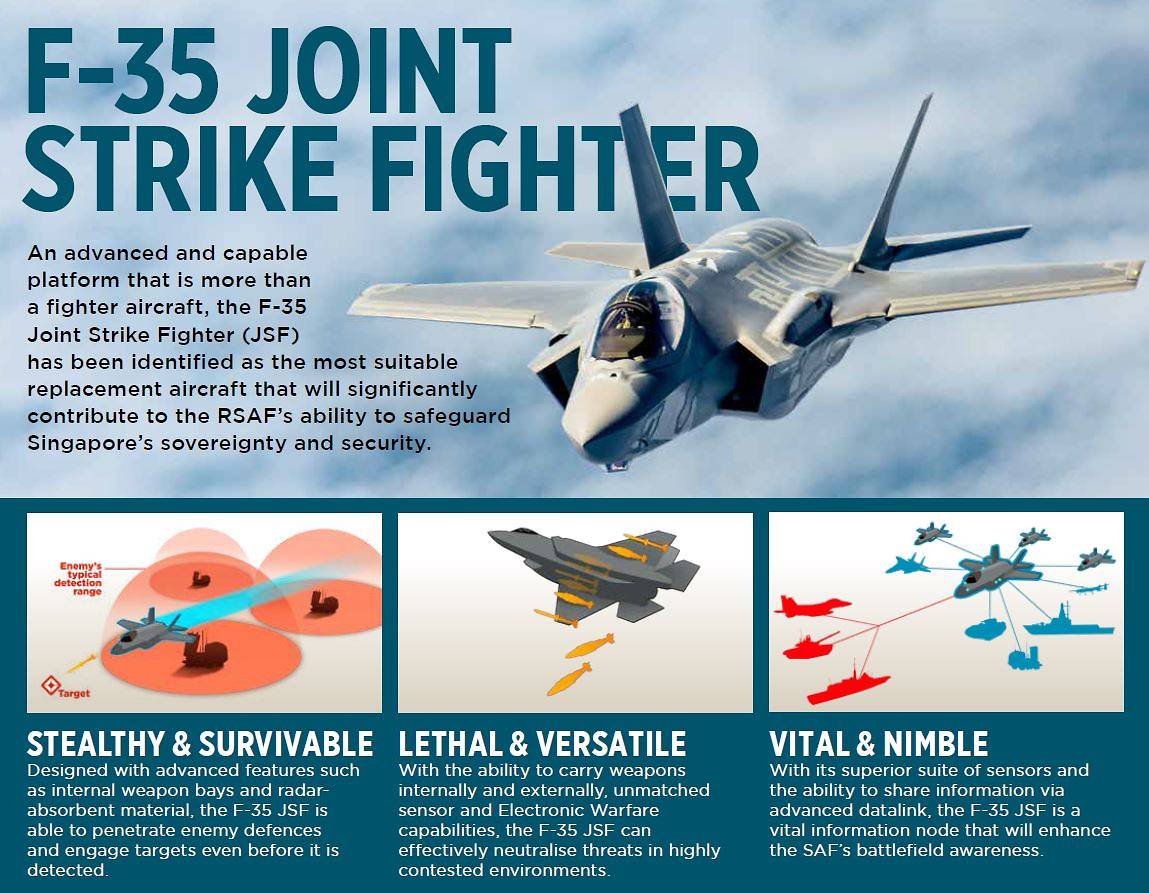
(Infographic: MINDEF)
In the skies, MINDEF plans to replace their F-16 fighter jets with the F-35s. This will mean that the future RSAF fighter fleet would consist of F-35s and F-15SGs. As such, MINDEF will place an initial order for four F-35s from the US, said Dr Ng.
“As stated previously, MINDEF will issue a Letter of Request (LOR) to the US to acquire F-35s. As required by US law for foreign military sales, the US Congress must approve the sale of F-35s,” he added.
READ: Singapore to buy 4 F-35 fighter jets with option for 8 more; price comparable to F-15SG
“Our LOR will request an initial acquisition of four F-35s, with the option of a subsequent eight if we decide to proceed. Singapore has the endorsement of both the United States Administration and the Department of Defense for our proposed purchase of F-35s, but the Congress must still approve it.”
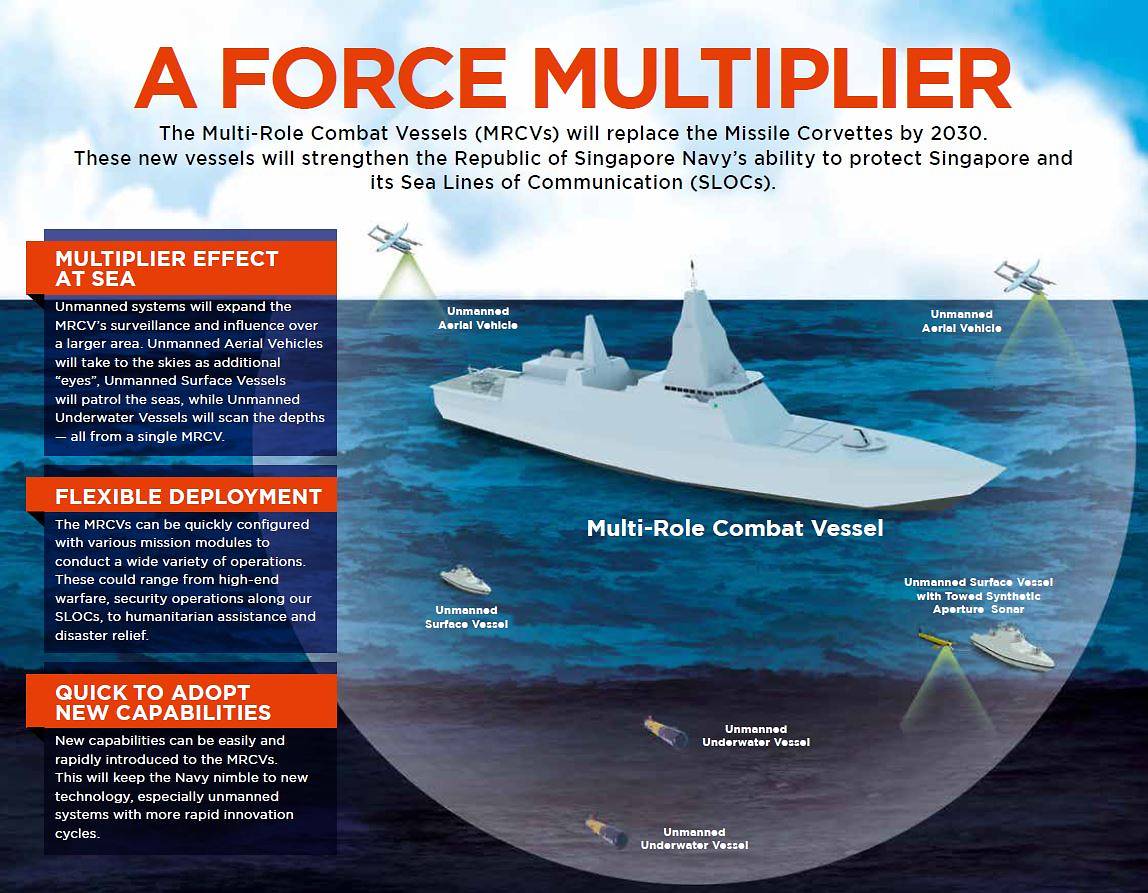
(Infographic: MINDEF)
The SAF will also be bolstering its sea capabilities, with the addition of new submarines and warships to its arsenal.
This includes the four new Invincible-class submarines – the first of which was recently launched in Germany, with the other three being built.
“The Invincible-class submarines will have longer endurance, and also the latest locally-developed sensors and automated systems designed for optimal use in our surrounding waters… We aim to have a full fleet of four Invincible-class submarines by 2025,” added Dr Ng.
READ: Made for Singapore: First of four custom-built RSN submarines launched in Germany
The SAF’s missile corvettes will also be replaced by the new multi-role combat vessels (MRCVs). The first of these vessels will be delivered around 2025, and full delivery is expected by 2030.
MINDEF will also “beef up” security for the entire coastline of Singapore, said Dr Ng.
This means the addition of more optical sensors and coastal radars to deter and detect potential threats as well as more unmanned watch towers for better coverage of the busy traffic across the Singapore Strait. Beginning next year, unmanned surface vessels will also patrol Singapore waters.
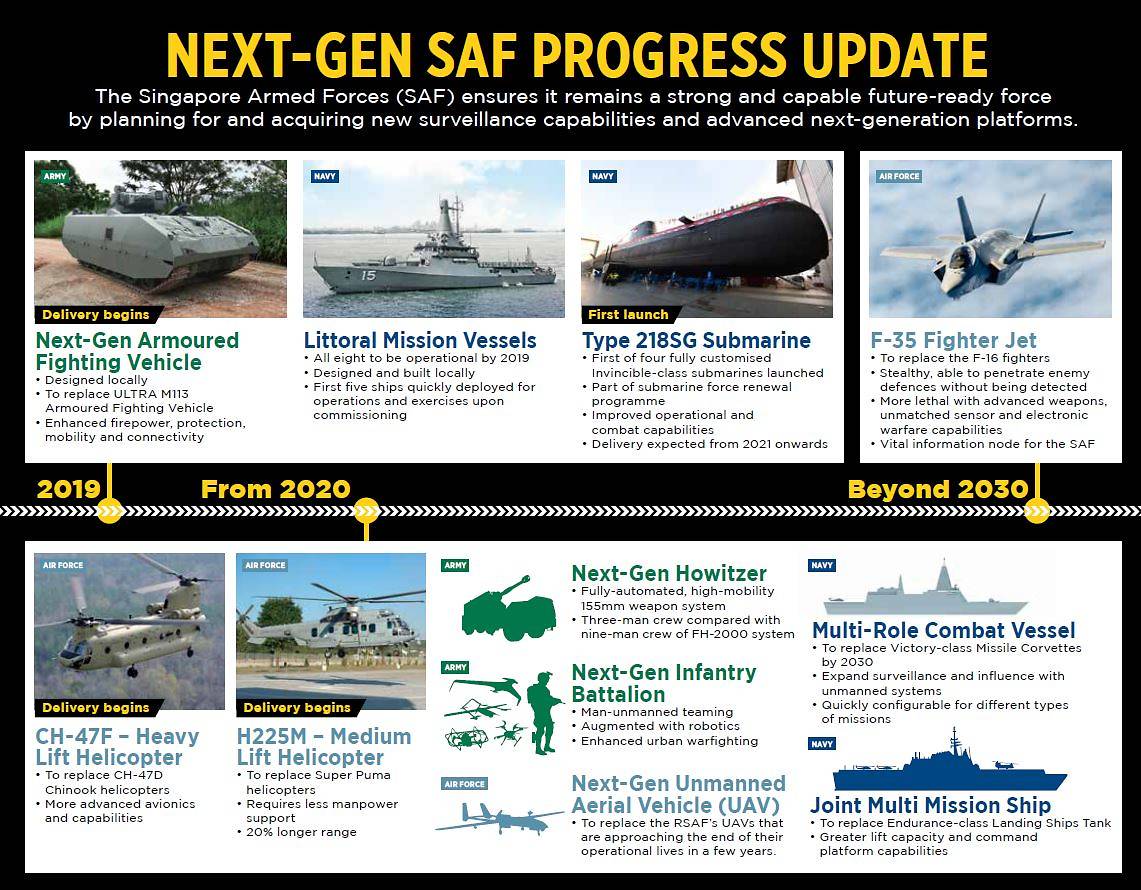
(Infographic: MINDEF)
For the army, new Next-Gen Armoured Fighting Vehicles will replace the M113 vehicles as the “mainstay” of Singapore’s mechanised forces from this year onwards, Dr Ng said.
“In all, the Next-Generation SAF of 2030 and beyond, with this full complement of assets in air, land and sea, will be able to defend Singapore for another generation. This is the SAF that will take us into and guard our future. This is the SAF that our investments have bought or will buy,” he added.
When it comes to digital defence, Singapore is vulnerable to the threat of “hybrid attacks”, including the targeting of IT networks to disrupt services and capabilities, said Dr Ng.
“Two years ago, I announced the setup of the Defence Cyber Organisation (DCO). DCO has stood up the Defence Cyber Security Centre… for daily operations against cyber threats targeted at MINDEF and SAF IT systems, especially our command and control computer networks,” he added.
Incident response teams are also in place for deployment to support other national agencies during cyberattacks on critical systems.
The SAF is also expanding the pool of regulars for the cyber domain under the Military Domain Experts Scheme, as well as the non-uniformed Defence Cyber Expert. More than 300 will be hired in the first phase.
NSFs also can play an “important” role in digital defence, said Dr Ng.
The 59-strong pioneer batch of the Cyber NSF Scheme who enlisted in late 2018 are now undergoing an eight-month-long Cyber Specialist Cadet Course and will graduate in August.
The Cyber Defence Test and Evaluation Centre has been built to train soldiers in a “realistic and challenging environment”, added Dr Ng. The Centre includes a “cyber range” that simulates the SAF’s networks and online traffic, using actual malware and attacks against these nodes.
The SAF will also tap on NSmen with IT expertise as a result of their civilian jobs or training.
INVESTMENT IN TRAINING FACILITIES
In tandem with its investment in hardware, MINDEF will also invest more into training facilities, said Dr Ng. This includes the construction of SAFTI city, a one-stop training facility which will complement the “traditional terrains” of the old SAFTI with “urban settings”.
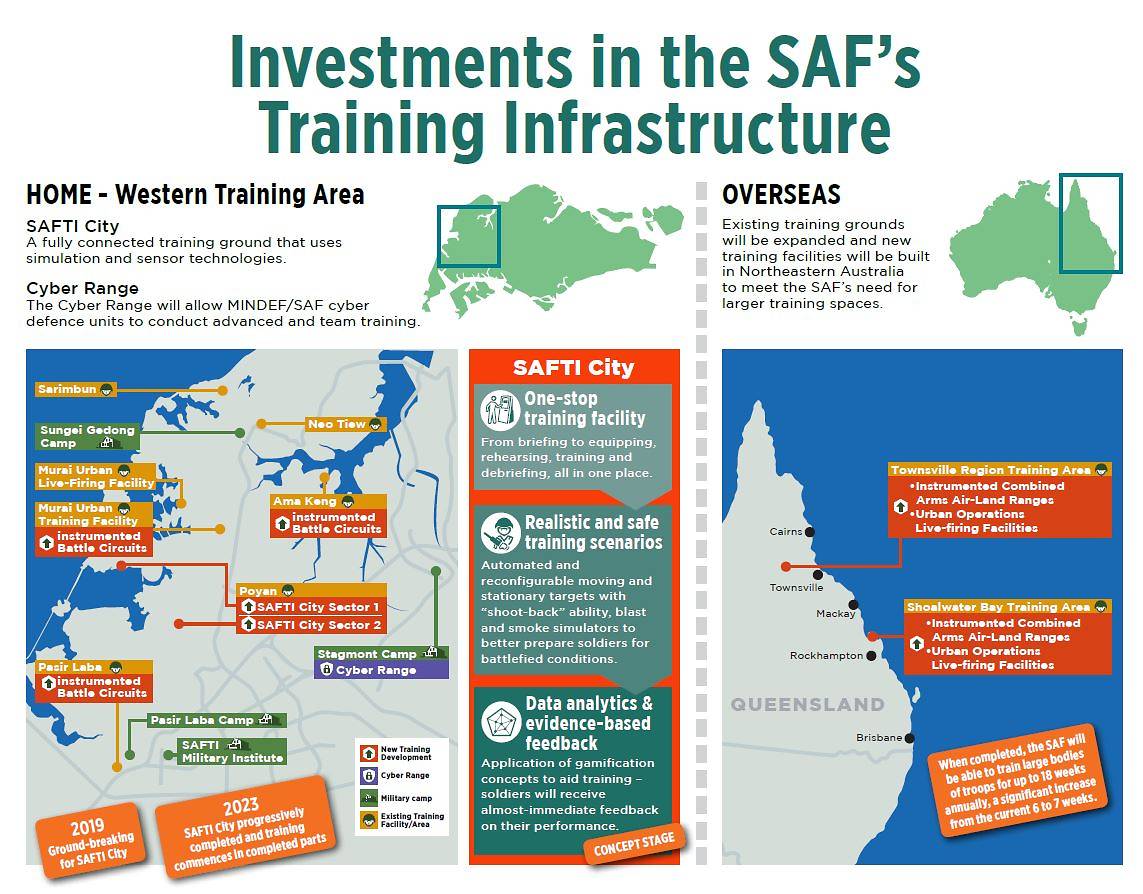
(Infographic: MINDEF)
He said: “I am glad to report that SAFTI City is taking shape and on schedule. We’ll build more roads and bridges so that motorised and mechanised troops in Army vehicles can start training this year. SAFTI City will be progressively built and when finished will have more than 200 buildings of varying heights and types, when completed.”
READ: SAFTI City ‘the size of Bishan’ to be built for army training
The facility is slated to be progressively completed in 2023.
Overseas, the SAF will expand its training areas in Australia under the Singapore-Australia Comprehensive Strategic Partnership. This includes the extension of training areas at Shoalwater Bay and new developments in Townsville Region in Northeast Australia.
New facilities such as Instrumented Combined Arms Air Land Ranges and Urban Operations Live-Firing Facilities are “on track” to being built, added Dr Ng. When the facilities are completed over the coming years, the SAF will be able to train large groups of troops for up to 18 weeks annually, a significant increase from the current six to seven weeks.
NEW NS HUB
Besides that, Dr Ng said MINDEF will also build a central facility to “better respond to the needs of the NS community”.
The New NS Hub, to be completed in 2023, will bring together the Central Manpower Base for the pre-enlistment process, medical centres for medical reviews, an e-Mart for buying NS equipment and a fitness conditioning centre for IPPT.
It will be located opposite Cashew MRT.
READ: Improving NS experience: New NS Hub brings together pre-enlistment medical, IPPT, e-Mart
“MINDEF will continue its efforts in defence diplomacy … We want to promote regional peace and stability,” said Dr Ng. “We make friends with those who are willing, and partner those countries whose interests are aligned with ours and who share our desire for inclusiveness, peaceful resolution of disputes and respect for the law.
“But at the same time, we must ensure that the SAF is strong and adequate to defend our rights when diplomacy fails and when others choose to do us harm or ignore our rights … A strong SAF protects Singapore and Singaporeans,” Dr Ng said.
